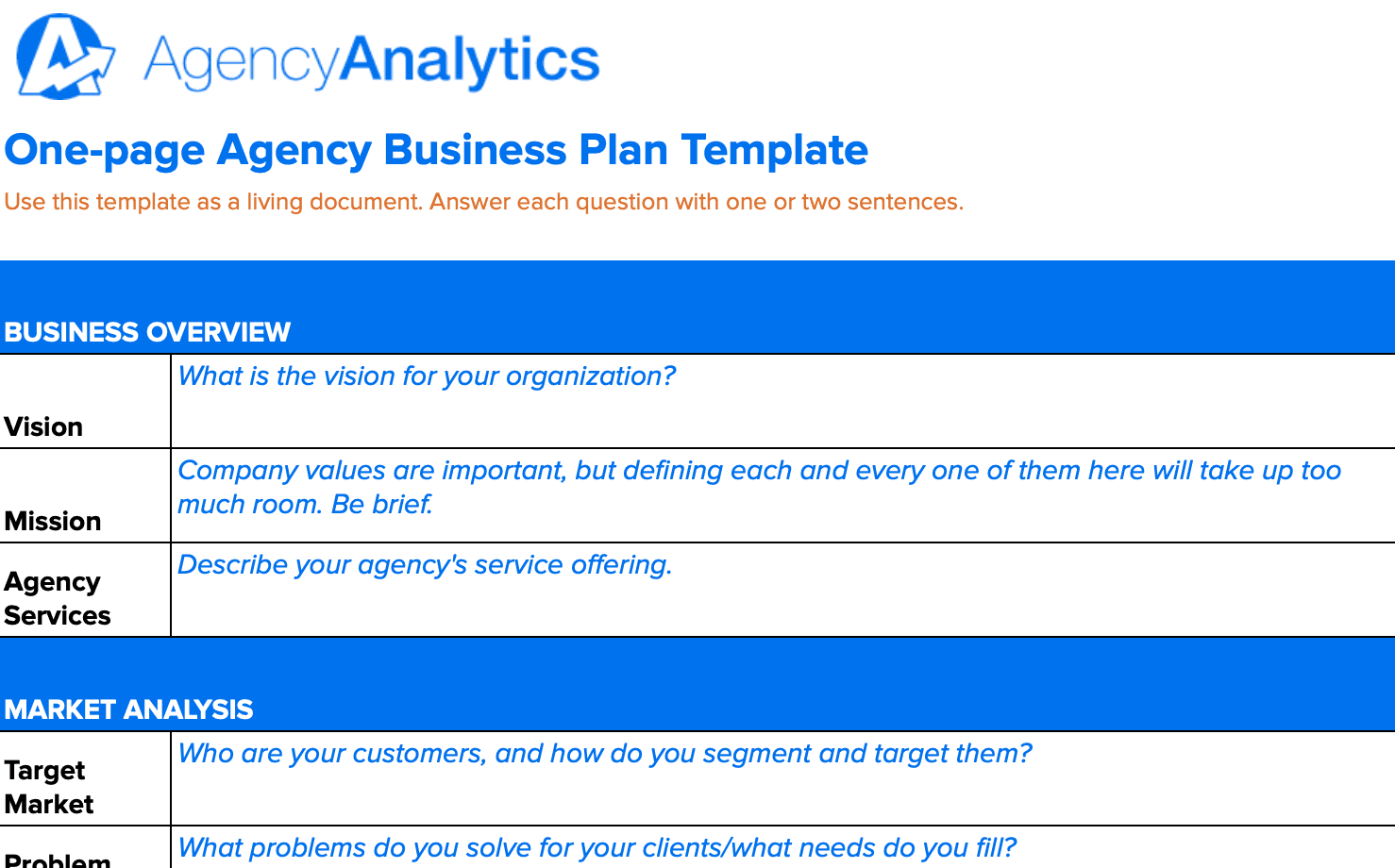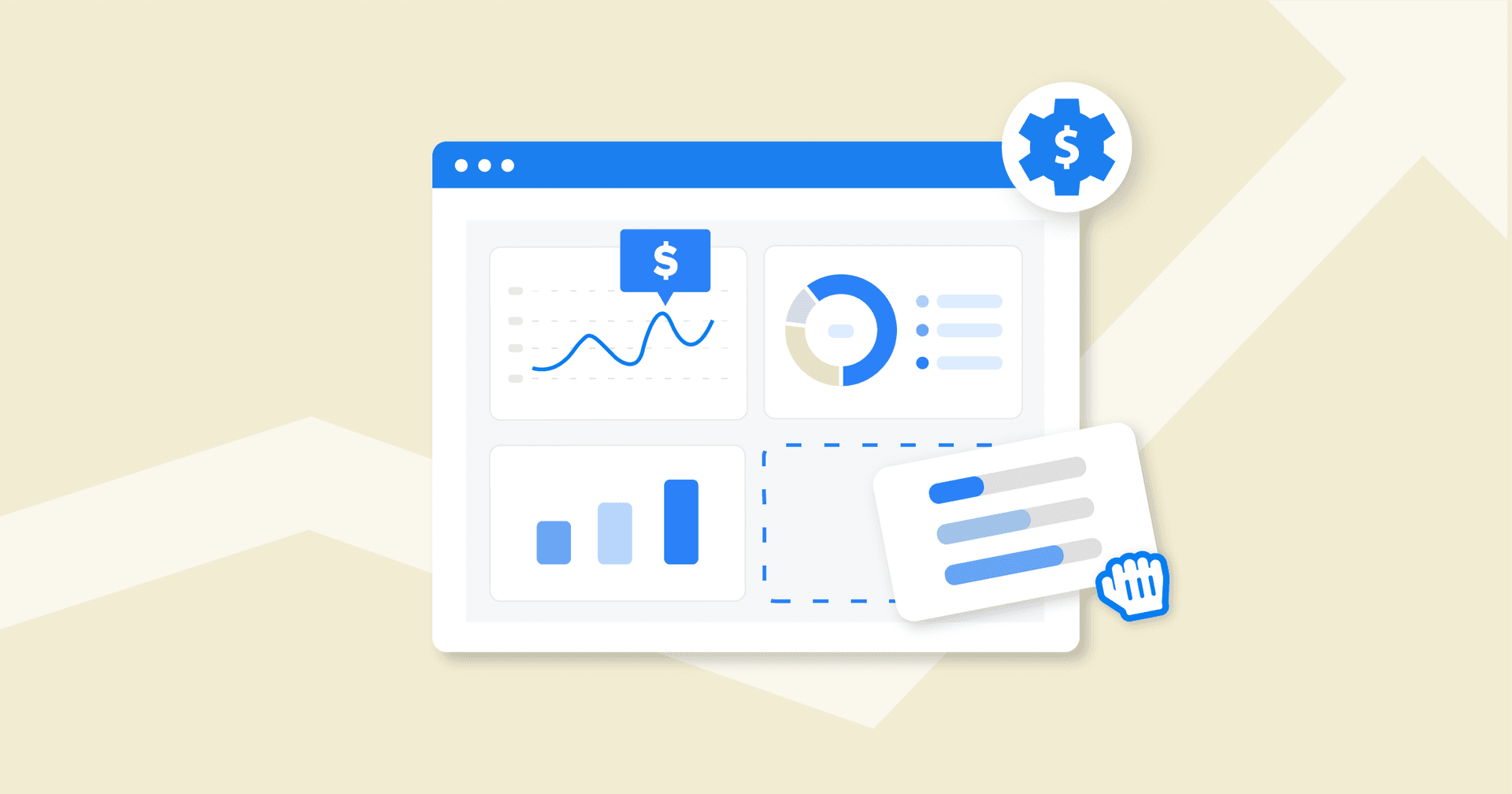Table of Contents
QUICK SUMMARY:
A one-page business plan simplifies a marketing agency's strategy, focusing on core objectives and actionable steps. Ideal for agencies seeking clarity in goals, it serves as an efficient roadmap. This article offers insights into crafting such a plan, highlighting its benefits for agencies aiming to streamline their strategic approach, with a template for developing your agency's focused business strategy.
Much like flossing or getting enough sleep, many leaders of marketing agencies are on the verge of a new business move–whether it’s growing their agency’s franchise or creating a separate branch with distinct services. They know they should create a business plan, but don’t. Whether it’s being overrun by “higher priorities” or questioning the value of this exercise altogether, it’s not uncommon for the business plan to fall by the wayside.
While it may be common for marketing agencies to operate without an actual written plan, that doesn’t mean it’s the smartest move for you. Enter the one-page business plan. The fast, effective way for marketing agency owners and CEOs to reap the benefits–without the herculean effort.
In this article, we’ll define the differences between traditional and one-page business plans and answer your questions about whether or not you should prioritize writing one for your marketing agency. (Spoiler alert: you should!)
We’ll cover:
What a One-page Business Plan Is Not
Before we define what it is, it’s easiest to define what it is not. A one-page business plan is not a traditional business plan. These are two different documents that serve different purposes for different audiences.
A formal or traditional business plan is a core document for any business, not just marketing agencies. They are a pitch–your proof of concept to get a loan or investment from a bank or venture capitalist. But they can also be used to formalize the vision of agency leadership to make sure everyone is on the same page.
Traditional business plans follow a standard structure and include a company’s executive summary, vision, and values, a general overview of operations and structure, marketing analysis, and financial projections. They can range from five pages to 50 and are usually accompanied by a formal presentation.
Some marketing agencies start without one–maybe yours did. And that’s OK. But we’re willing to bet that the most successful agencies, from Omnicom Group to Deloitte Digital, are definitely not winging it today; they each have meticulous business plans. Guaranteed.
Additionally, formal business plans are essential for acquiring loans or investments, particularly from established institutions. Bankers, venture capitalists, and angel investors will all expect to see a written plan at the outset. So, if you are actively looking for funding, focus on creating a traditional business plan to wow potential investors. Of course, it’s more than just a pitch to investors. It’s also an excellent resource for your executive team as your agency grows and changes.
However, not every agency has the time–or the need–for a 50-page business plan. This is where the one-page agency plan comes in. It can provide the same value as a traditional one in a condensed format that makes it more accessible and easier to use on a regular basis. It may be shorter than a traditional one, but it is equally vital to your company’s growth and scalability.
Ok, So What Is a One-Page Business Plan?
Think of your agency’s growth as an epic quest. There will be bumps in the road and a cast of colorful characters. As you journey onward, you’ll pick up new skills and ditch the dead weight. Where does a one-page business plan factor into this journey? It’s your GPS.
Your one-page plan is where you input your destination and map the most efficient route to get there. It’s how you know whether you’re making progress or falling off track. It’s this mapped trajectory toward your goals that keeps your agency focused–and for marketing agencies, focus equals growth, scalability, and more satisfied clients.
Unlike a traditional business plan, which is a lengthy and detailed formal pitch to investors, the one-page version is a scaled-back version of the same information distilled down to the essence of your business. You can use a one-page plan as a pitch document for certain investors or as the starting point when you write your formal document. But it can also serve as an internal document to keep you and your staff on target. As the name implies, it’s just one page long.
From Shakespeare to Thomas Jefferson, a lot of smart people praise the power of brevity–and complain that it’s harder to be concise than it is to be long-winded. It may be a challenge to condense the expansive concepts of objectives, USP (Unique Selling Proposition), financial projections, etc., into one or two short, simple sentences. But persevere! There’s no room–and no need–for fluff. Your plan will be powerful because it’s short.
Can I Skip Writing One?
Sure! You can skip this valuable exercise in the same way you can skip flossing–but it’s not smart in the long run.
Many marketing agency owners or CEOs don’t get around to creating this living document because of three misconceptions. Raise your hand if any of the following concerns are the reasons you’ve delayed writing yours:
It’s going to be time-consuming to write
It’s a ceremonial document that isn’t practical or useful
It’s not your highest priority
Let’s tackle each of these misconceptions.
1. It’s Going To Be Time-consuming To Write
You get to decide how much time you will invest in this project. You can weigh the cost of your time against defining what success looks like to your business and specifying how you will get there. You choose the amount of time that you think is appropriate.
But think of it like that old adage “Measure twice, cut once.” The more time you spend understanding how you will achieve your agency goals, the better you will be able to envision your path forward. This could save you a lot of time–and costly mistakes–down the road.
2. It’s a Ceremonial Document That Isn’t Practical or Useful
This is going to sound a bit harsh: if that’s what you end up with, you didn’t do it right. (Don’t worry, if you follow this guide, that won’t happen.) A one-pager can–and should–provide important guidance for every aspect of your agency from daily operations and hiring to sales and customer retention.
3. It’s Not Your Highest Priority
When weighed against other urgent tasks and competing demands on your time, you may feel like your agency plan should go on the back burner. But how will you know if your staff is working on the right things to grow and scale your agency if you’ve never defined or documented your goals and milestones? Putting in the initial work to do this exercise can save your team from wasting time, effort, and resources later.
As Rob Da Costa said in his recent Agency Accelerator podcast, “We’re all really busy, but no one wants to be a busy fool.”
The Benefits Of a One-page Business Plan
We wouldn’t ask you to read a blog about them if they weren’t important (just like your dentist doesn’t ask you to floss for the heck of it). We’re all about helping agencies produce quality work quickly and easily, not about persuading you to spend your limited time and resources doing busy work or vanity projects.
A business plan improves the decision-making abilities of the executive team by proactively answering some of the most critical questions you will face and acting as a rubric to assess performance. Business leaders, authors, marketing professors, and other experts all agree: having a plan that evolves with your business is a major differentiator between businesses with sustained growth and those that plateau.
The reason is competitiveness. Without a strategy that specifies an agency’s competitive edge and defines a targeted market, that agency is eclipsed in a sea of generalized agencies. As world-renowned marketing expert Peter Levitan says, “you need to be unignorable.” Your one-page plan defines how you are unignorable.
What Should I Include in My One-page Plan?
OK, so by this point, you’re clear on what a one-page plan is and is not and why it’s a worthwhile exercise. Now let’s get into how to structure it.
Business plans typically include some or all of the following sections. A one-page plan could include them all or a selection or merge some ideas together. Peter Levitan recommends that you think of your one-page plan as a tool you would use if you were selling your agency: “I like the idea of having the idea of an eventual sale as a guide. How will you grow agency value–if only for a sale five years down the road?”
The Free One-page Agency Business Plan Template
We encourage you to start with this outline and adapt it to suit your needs.

How Do I Write One?
There’s no one-size-fits-all way to write a business plan. The method that will be most effective for you is as unique as your agency and is deeply rooted in context. Where you are in the agency lifecycle, what niche you serve, how many staff you have, and what you offer in your market–these all play a role in how you handle this task.
Generally, when someone hears “business plan” it conjures up ideas of the visionary CEO alone in his or her office, coming up with the magical ideas that set their agency on a path to success. Sure, that’s one (totally valid) way to do it. But if you find this task too daunting, or find your solo draft lacking, let us suggest a few alternative processes.
Method 1: Co-create it with your trusted inner circle or your c-suite.
This could be an offsite leadership meeting where you tackle big-picture questions for your agency. This is the best option for an agency with an experienced crew of executives at the helm.
Method 2: Invite all staff to contribute ideas in a group brainstorm or a shared document.
If you’re a new or small agency with bright employees and a flat organizational structure, consider allowing your staff to contribute to the vision and plan of your agency. Set expectations immediately that this is an idea-sharing exercise only and define who will have the final say on the strategic direction of your agency.
You might be surprised at the insight you gain about the team itself. This is the best option for small but mighty agencies that pride themselves on their team culture.
Agency Tip: Considering a change to your org. chart? Read this article for the pros and cons of a traditional hierarchy versus a pod structure.
Method 3: Hire a consultant who specializes in business planning.
While it may not be the cheapest choice, it may be the quickest and most effective. If you’re feeling particularly concerned about getting it “right”, there are professionals who can ask insightful questions and get to the heart of what your business is all about–and where it’s headed. This is the best option for an agency owner who sees the value of this exercise and wants to get it done quickly while ensuring quality.
Just as important as the initial writing of this plan is the rewriting. A one-page agency plan is meant to be a “living document”; that’s the only way it remains a useful waypoint for your employees and relevant for your agency as a whole. That means you can–and should–update it regularly, whether on a set schedule or when you’re on the cusp of big changes at your agency.
Your agency–and this industry–is constantly evolving, and your business plan should not only reflect that but anticipate that. As Peter Levitan wrote, “Not having an updated plan that recognizes industry shifts is a bad idea that will most likely impede your revenue quest.”
How Do I Use It at My Marketing Agency?
Whether or not you write this document alone, with your second-in-command, or with your entire team, make sure the end result is shared widely and often. A business plan that gets filed away on your computer, never to be seen again, is utterly useless.
You’ll need to experiment until you land on the most effective communications methods that work for your agency. These will vary widely based on the size and maturity of your team, whether or not your staff works remotely, how frequently you meet, etc. But let these tips inspire you to look for ways to use your plan in the day-to-day running of your business.
Read It in Meetings
Start meetings by reading a line or two from your business plan. These could be someone’s personal favorite, a random selection, or hand-picked by the meeting organizer based on relevance (e.g., quarterly financial review, read from the financial projections section).
Sign Your Emails With It
Use the best line from your business plan as your company-wide email signature.
Put It on Your Walls
Design posters or artwork that include keywords or phrases from your business plan. Hang them around the office, or mail mini versions (such as postcards, notepaper, or printed on water bottles or t-shirts) to your remote staff.
Use It in Your Online Workspaces
Provide digital versions of this artwork that staff can use as LinkedIn cover photos, desktop backgrounds, etc.
Make It Available
Create a “big picture” folder that’s accessible to everyone on your shared drive. In this folder, you should have PDFs of your business plan, your company values, your client profile(s), your brand guidelines, and any other strategic information that every employee should use to guide their day-to-day work.
Start–or End–Every Presentation With It
Create a slide (just one slide!) for your company’s branded PowerPoint template with the top takeaways.
Make It Part of Managing
Encourage the leaders in your company to review it often with their teams. Managers should help their direct reports connect goals, projects, and tasks directly to the plan and also compare performance against the business plan during performance reviews.
Review It Together
Host an annual or bi-annual company-wide meeting where you review the document and unveil any revisions (or workshop them as a team).
Use It for Hiring, Onboarding, and Training
Train your HR teams and hiring managers to include selections from your business plan in job postings and to work them into questions during interviews. Likewise, ensure training and onboarding includes practical examples of how your staff can use the plan in their work.
Start With a One-page Plan To Scale Your Agency
Are you a young agency, and the idea of a written plan makes you feel hemmed in? Are you a mature agency worried a business plan might kill your team’s flexibility or stifle their creativity? Are you concerned that your employees will raise their eyebrows when you change direction to capitalize on new opportunities or pivot to avoid obstacles? Don’t be.
Research shows that the most successful businesses plan ahead, but they also adapt their plans as needed. So keep that document alive and update it regularly with small or big changes.
So, if you’re an agency owner who has put off writing your business plan. A one-pager forces you to do the strategic thinking to answer important questions about how your agency will differentiate from competitors, target customers, and what milestones you’ll aim for on the road to success.
Ultimately, agency scalability and growth are about honing in on the unique skills and services that only you can provide and reaching the customers who specifically need your skillset. The one-page business plan is your GPS, keeping you on track to your goals. Plus, it provides a useful starting point for writing a traditional one, should you need one to approach investors.

Written by
Elyse Gagné develops branding and content strategies that unite businesses with their customers. A podcast junkie, you'll find her learning about the latest technologies and brand storytelling techniques while she gardens or hikes.
Read more posts by Elyse GagnéSee how 7,000+ marketing agencies help clients win
Free 14-day trial. No credit card required.






